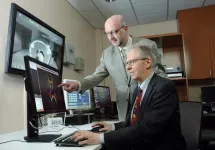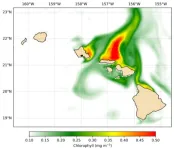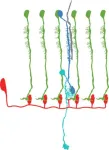(Press-News.org) New Orleans - Ochsner Health physicians Dr. Richard Zweifler and Dr. Joseph Tarsia are co-authors on a post hoc analysis carried out in the ARCADIA randomized clinical trial, comparing the effectiveness of apixaban versus aspirin in preventing adverse clinical outcomes in patients with a history of cancer and cryptogenic stroke. The research found no significant difference in the risk of major ischemic and hemorrhagic events between those taking apixaban and aspirin. The study was published in the JAMA Neurol journal and registered under ClinicalTrials.gov.
The ARCADIA study was a multicenter, double-blind, randomized clinical trial conducted between 2017 and 2020. The primary outcome measure was a composite of major ischemic and hemorrhagic events, including ischemic stroke, systemic embolism, myocardial infarction, or vascular death. A total of 1015 participants were enrolled in the trial and followed up for a median duration of 11.1 months.
Participants in the study were adults with recent cryptogenic stroke and biomarker evidence of atrial cardiopathy, such as an enlarged left atrium or high levels of natriuretic peptides. They also had a history of cancer within the past ten years.
The findings of this post hoc analysis suggest that both apixaban and aspirin may be effective in preventing adverse clinical outcomes in patients with a history of cancer and cryptogenic stroke. However, further studies are needed to confirm these results and determine the optimal treatment for this patient population.
"Our findings from the ARCADIA trial provide important insights into the impact of apixaban and aspirin on patients with a history of cancer and cryptogenic stroke. Although we did not observe a significant difference in the risk of major ischemic and hemorrhagic events, this is only the beginning. Moving forward, we plan larger studies that will provide greater power to evaluate potential differences in antithrombotic strategies in cryptogenic stroke patients with a cancer history.” said Dr. Richard Zwiefler.
Moreover, it is essential to note that this post hoc analysis was not pre-specified in the original study protocol and should be interpreted with care.
END
Apixaban vs aspirin in patients with cancer and cryptogenic stroke
2024-10-31
ELSE PRESS RELEASES FROM THIS DATE:
Can magnetic pulses aimed at the brain treat insomnia?
2024-10-31
Traditional solutions for sleep disorders, including medications and cognitive behavioral therapies, often provide insufficient relief for military personnel, a problem researchers from the University of Arizona College of Medicine – Tucson will be hoping to solve with a $3 million grant from the Department of Defense Congressionally Directed Medical Research Program.
Sleep problems are among the top health concerns of military personnel, with an estimated 85% meeting criteria for a clinically relevant sleep ...
F.M. Kirby Research Center honors 25 years of pioneering brain imaging research
2024-10-31
BALTIMORE, October 31, 2024— Kennedy Krieger Institute is proud to celebrate the 25th anniversary of the F.M. Kirby Research Center for Functional Brain Imaging at Kennedy Krieger Institute, a leader in advancements and research in understanding the human brain.
Established in 1999 in partnership with Johns Hopkins University School of Medicine, the center has transformed neuroscience and medical imaging by developing cutting-edge magnetic resonance imaging (MRI) techniques that allow researchers to examine and measure brain function and structure ...
$1.75M CDC grant funds study to boost vaccine acceptance in Arizona’s rural, border communities
2024-10-31
Researchers at the University of Arizona’s Mel and Enid Zuckerman College of Public Health received a $1.75 million Centers for Disease Control and Prevention grant to conduct a community-based, participatory research study designed to improve vaccine uptake in Arizona’s rural and border communities.
Vaccination is a highly effective public health intervention that saves millions of lives per year, yet vaccination rates have declined in recent years for a variety of reasons, ranging from safety concerns to religious and philosophical objections.
“Vaccination is a cornerstone of public health,” said co-principal investigator Tomas ...
Immune system review provides insight into more effective biotechnology
2024-10-31
Macrophage cells are the immune system’s frontline soldiers, early on the scene to protect the body from foreign invaders. These cells answer the immune system's critical question for the rest of its troops: friend or foe?
As critical responders, macrophages can perceive helpful biotechnology as threats. If not created with the right materials or mechanical forces, these devices can trigger an immune response that can cause inflammation, scar tissue or device failure.
But what is the right material or the right mechanical force? In a meta-analysis co-led ...
Remote control eddies: Upwelled nutrients boost productivity around Hawaiian Islands
2024-10-31
Beyond colorful coral reefs and diverse nearshore ecosystems, Pacific Ocean waters surrounding the Hawaiian Islands have comparatively little marine life and low biological productivity. New research published by University of Hawai‘i (UH) at Mānoa oceanographers showed that eddies on the leeward side of the Hawaiian Islands can supply nutrients, not only locally, but also to the opposite side of the island chain and stimulate blooms of phytoplankton, microscopic plant life that lives in the surface ocean.
The study, published in JGR Oceans, was selected by the American Geophysical Union’s editorial board as a featured article.
“While ...
Rice, Texas Medical Center institutions jointly award seed grants
2024-10-31
Rice University together with Baylor College of Medicine and the Houston Methodist Academic Institute has awarded seed grants in support of research on health equity and digital health.
Spearheaded by Rice’s Educational and Research Initiatives for Collaborative Health (ENRICH) office in collaboration with the two partnering institutions in the Texas Medical Center (TMC), the seed grant opportunity followed the Health Equity Workshop hosted earlier this year by Rice’s Digital Health Initiative.
“To achieve equitable health outcomes, a comprehensive approach is essential — one ...
Sleeping for 2: Insomnia therapy reduces postpartum depression, study shows
2024-10-31
While many people believe that poor sleep during pregnancy is inevitable, new research has determined that cognitive behavioral therapy for insomnia (CBTi) while pregnant can not only improve sleep patterns but also address postpartum depression.
Researchers from UBC’s Okanagan and Vancouver campuses, as well as the University of Calgary, discovered that delivering CBTi during pregnancy significantly reduces postpartum depressive symptoms after a baby arrives.
“Early intervention is crucial for infant and parental mental health,” says Dr. Elizabeth Keys, an Assistant Professor in UBCO’s School of Nursing and a study co-author. “Our research explores how addressing ...
How fruit flies achieve accurate visual behavior despite changing light conditions
2024-10-31
When light conditions rapidly change, our eyes have to respond to this change in fractions of a second to maintain stable visual processing. This is necessary when, for example, we drive through a forest and thus move through alternating stretches of shadows and clear sunlight. "In situations like these, it is not enough for the photoreceptors to adapt, but an additional corrective mechanism is required," said Professor Marion Silies of Johannes Gutenberg University Mainz (JGU). "Earlier work undertaken by her research group had already demonstrated that such a corrective 'gain control' mechanism exists ...
First blueprint of the human spliceosome revealed
2024-10-31
Researchers at the Centre for Genomic Regulation (CRG) in Barcelona have created the first blueprint of the human spliceosome, the most complex and intricate molecular machine inside every cell. The scientific feat, which took more than a decade to complete, is published today in the journal Science.
The spliceosome edits genetic messages transcribed from DNA, allowing cells to create different versions of a protein from a single gene. The vast majority of human genes – more than nine in ten – are edited by the spliceosome. Errors in the process are linked to a wide spectrum of diseases including most types of cancer, neurodegenerative conditions and genetic ...
The harmful frequency and reach of unhealthy foods on social media
2024-10-31
An analysis of social media posts that mention food and beverage products finds that fast food restaurants and sugar sweetened beverages are the most common, with millions of posts reaching billions of users over the course of a year. The study, published in the open access journal PLOS Digital Health, highlights the sheer volume of content normalising unhealthy eating, and argues that policies are needed to protect young people in the digital food environment.
Obesity is a health challenge around the world and food environments, including in the digital space, can influence ...






